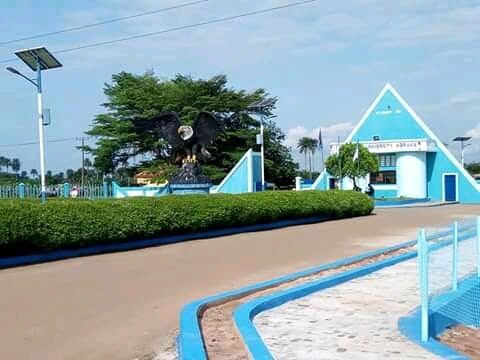The philosophy and objective of the Department remains essentially the same, namely to train Civil Engineers and Environmental Engineers and hence provide the high level technical manpower needed in both the public and private sectors of the economy.
The Department soon grew rapidly both in academic and supporting staff strength to become one of the best staffed Civil and Environmental Engineering Departments in the Nigerian University System; with specialization in all the traditional areas of the Civil Engineering discipline.
Although some of the founding staff have left for greener pastures, the Department still remains one of the best staffed in the country with its new breed of advanced/experienced staff and young/dynamic staff who are passionate in lecturing and research and either have obtained degrees from renowned universities or are currently studying.
The Department is committed to acquiring the necessary research and training facilities with the assistance of the university and other reputable sponsors. It presently has six laboratories.
These are:
- Soil Mechanics/Geotechnical Engineering Laboratory
- Structures Laboratory
- Highway/Transportation Laboratory
- Fluid Mechanics/Hydraulics Laboratory
- Environmental/Public Health Laboratory
- Survey Studio
In the drive for excellence, and keeping up with the state of the art technological advances of the century and beyond, the Department has continued to provide the necessary environment for promoting the acquisition of basic background in Civil Engineering/Environmental Engineering and to prepare students to accept ultimately the complex responsibility of professional leadership.
Vision, Mission Statement and Core Values
The vision of the Department is to be the best Civil Engineering Department in Nigeria.
The mission is to train civil engineers, who will provide the high level technical human resources needed in the national economy. We intend to achieve this by:
- Teaching and training our students to acquire the technical competence for the design development, testing and production of facilities, works, systems, devices, and products that are of benefit to mankind;
- Providing facilities for teaching and research and human capacity development; and
- Designing our curriculum to meet the needs of industry and society at large.
Our core values are:
- Excellence in teaching, learning, and research
- Self-reliance
- Spirit of enquiry
- Fairness
- Entrepreneurship
- Global Best Practice
Philosophy and Objectives
The Department of Civil and Environmental Engineering in the Faculty of Engineering in Delta state University has as its primary function the education and training of students to have the technical competence for the design development, testing and production of devices, systems, and products that are of benefit to mankind.
The graduates should have an interest in, and capability for, the application of engineering principles to real life problem solving.
The Department has established a foundation for continuing education and for maintaining competence in solving new problems as they arise.
Accordingly, the Department provides in addition to residence education, Programmes in research, development and continuing engineering education.
The undergraduate programme(s) address the pressing societal needs and also meet the standards set by the Council for the Regulation of Engineering in Nigeria (COREN). The department is designed to give the students a degree which is both internationally respectable and individually flexible.
Thus, to stand the test of time, our programme(s) have the following features:
- Common foundation years;
- Workshop practice/technology, laboratory work, and tutorial;
- Broad-based Engineering and interaction between students and professionals;
- Special skills and in-depth study in a particular area of the programme through optional or elective courses;
- Adequate knowledge in areas of Engineering Management, Economics and Law;
- Emphasis on design, fabrication, installation, and maintenance of products and adaptation of exogenous technology to solving local problems;
- Emphasis on computer –assisted engineering;
- Projects in final year on which the students work alone under supervision.
The Department of Civil and Environmental Engineering is also committed to the provision of quality Civil Engineering and Environmental Engineering Education aimed at impacting Civil Engineering and Environmental Engineering Competence and Development of skills to both staff and students at all levels.
The Department has the objective of turning out Graduates of Civil Engineering/Environmental Engineering Profession who would be found worthy both in character and in learning.
To train Civil engineering/Environmental engineering Students to have interest in the capability and the application of Civil Engineering/Environmental engineering principles to real problem solving.
Admission Requirements
The Minimum admission requirements for entry into the 5-year Bachelor of Engineering Degree programme(s) in Civil Engineering and Environmental Engineering are Five 0-Level credits obtained in not more than two sittings, which must include English Language, Mathematics, Physics, Chemistry and any one of Biology, Agricultural Science, Technical Drawing, Further Mathematics (preferred) .
Also required is a score in University Matriculation Examination (UME) and Post UME, which is administered by the Delta state University, not below the Cut-Off Point or Minimum score stipulated for English, Mathematics, Physics and Chemistry in Basic Studies for the Year in question.
Entry Requirements
Credit passes at the SSCE, WASC/GCE O-level, NECO in English, Mathematics, Chemistry, Physics and any one of Biology, Agric. Science, Technical Drawing, and Further Mathematics (preferred).
The minimum admission requirements for entry into the 5-year Bachelor of Engineering Degree Programmes are five O-level credits which must include English Language, Mathematics, Physics, and Chemistry.
Click on page 2 below to continue Reading!!




